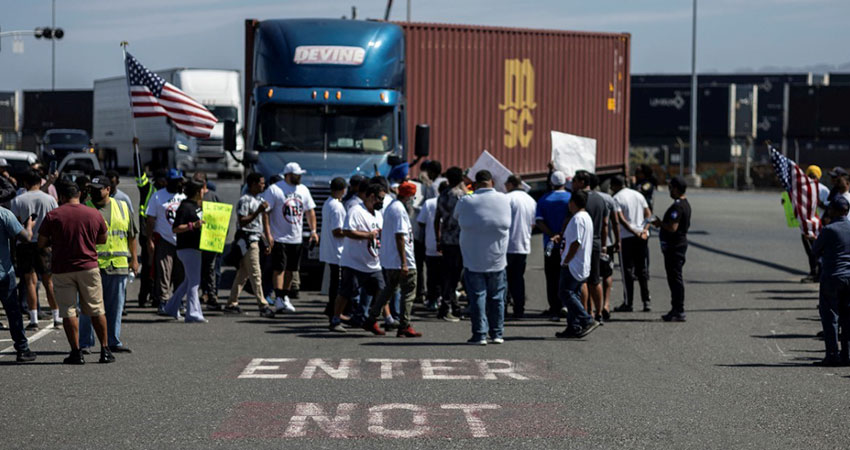AB5 protest Monday at the Port of Oakland (photo credit: REUTERS/Carlos Barria)
Truck drivers blocked the Port of Oakland Monday, protesting California’s AB5 law that requires contractors to be reclassified as employees. The law affects an estimated 70,000 independent truckers, many of whom fear losing their livelihood, according to various media reports.
The group planned to stage the protest through Wednesday, snarling the movement of goods in and out of the busy port while chanting “free our drivers,” the San Jose Mercury News reported. FreightWaves put the number of protesters at more than 1,000 Tuesday, while adding union longshoremen and warehouse workers are honoring the protest line.
“It’s going to put us out of business,” Carlos Flores, 42, an Oakland-based truck driver for nearly 20 years, told a Mercury News reporter. “We’re fighting for the right to work.”
And the protests are surely having an impact. According to tracking from supply chain platform project44, the Port of Oakland is now seeing average dwell times of 17.5 days, up from 12.4 days on July 11. The ports of LA and Long Beach, by comparison, were seeing dwell times decrease during that period, from 8 days to 5.2 days and 7 days, respectively, although also hit by trucker protests last week.
On top of all that, the Biden administration has thus far refused to step into contract negotiations between owners and unions representing rail workers and West Coast dockworkers, with the specter of crippling strikes looming. No one wants a rerun of the 2015 port shutdowns.
AB5 went into effect at the end of June, when the U.S. Supreme Court declined to hear an appellate challenge requested by the California Trucking Association (CTA). The group asserted AB5 would have a severe negative impact on the trucking sector, already affected by supply chain backups and a lingering driver shortage.
The CTA asserted AB5 “would cause motor carriers and owner-operators to bear the substantial, if not insurmountable, costs and burdens associated with shifting to an employer/employee business model.”
Industry experts told Multichannel Merchant that AB5, while intended to force gig-dependent firms like Uber and DoorDash to give drivers a better shake, would cause an exodus of trucking firms from California, making a bad situation worse.
“Now we’re going to throw gas on the fire with an entirely new driver model for many carriers,” said Joe Wilkinson, VP of transportation consulting for enVista. “That may not be a good analogy, as even gas takes a second to ignite, whereas with the denial of the CTA’s appeal AB5 goes into effect right now. This leaves affected carriers and independent drivers scrambling for a solution.”

